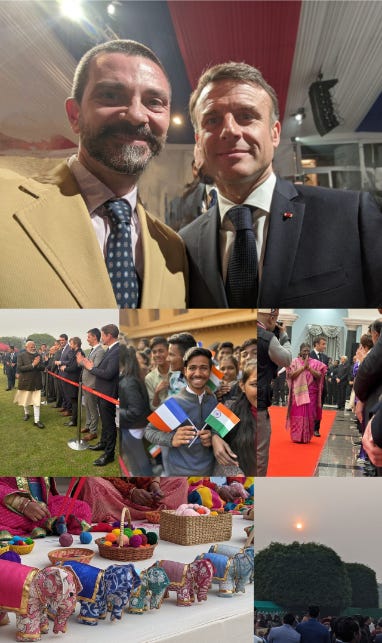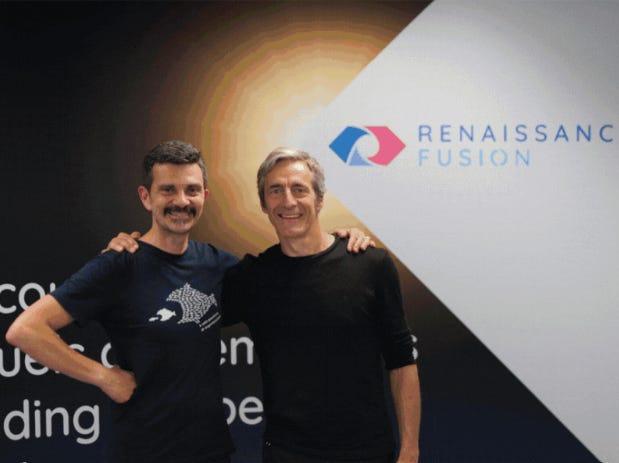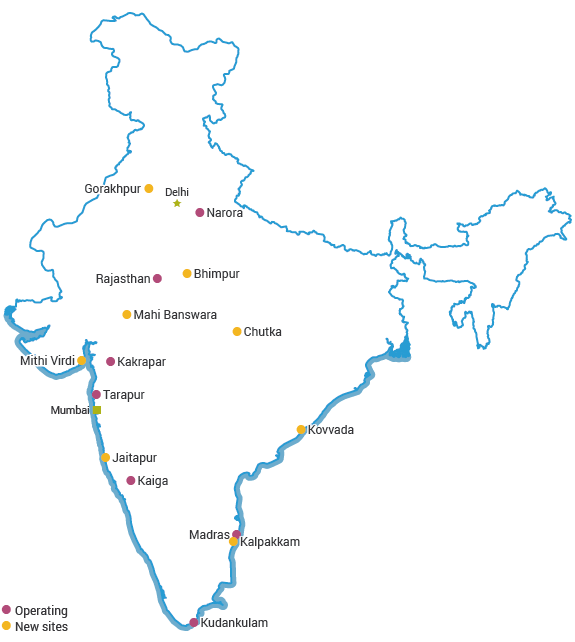02: Francesco Volpe's Journey: Accompanying Macron to India's State Visit and Forging Bonds in the Indian Nuclear Energy Sector
Francesco Volpe, the founder of Renaissance Fusion, a pioneering startup in fusion technology, shares his journey in accompanying Macron on a state visit to India for its 75th Republic day.
Hey Kula Community! 👋
Imagine yourself as the founder of a seed startup, and then envision the President of France inviting you to join him for lunch a couple of times and then extending an invitation for a trip to India to celebrate the 75th Republic Day of India. How exciting is that?
Well, this is the story of Francesco Volpe, which we are about to share with you.

Who is Francesco Volpe?
Francesco Volpe, an exceptional physicist from Italy, has a journey spanning continents, driven by his passion for Physics.
After completing his education in physics at the University of Pisa and obtaining a Ph.D. from Universität Greifswald, he worked at prestigious institutions such as the Max Planck Institute for Plasma Physics and General Atomics. Transitioning into academia, he became an assistant professor at the University of Wisconsin-Madison and later at Columbia University.
Eager to blend his scientific expertise with entrepreneurial skills, Francesco pursued an Executive MBA at ESCP. Subsequently, he founded Renaissance Fusion with the ambitious goal of revolutionizing energy production through cutting-edge nuclear fusion technology.
Renaissance Fusion: Pioneering Fusion Energy Technology
Francesco Volpe and Martin Kupp founded Renaissance Fusion in the French city of Grenoble in 2019. The start-up is dedicated to revolutionizing the energy landscape by developing abundant and clean energy solutions through fusion technology.
Their primary focus lies in advancing high-temperature superconductors (HTS) and liquid metal technologies, essential for achieving controlled fusion reactions. These technologies enable the creation of the extreme conditions necessary for fusion, where hydrogen isotopes fuse to release vast amounts of energy, much like the process that powers the sun. (Check out this video in which Francesco talks about the technology)
The company collaborates with leading research institutions and universities globally to accelerate progress in fusion energy research. They raised a 15M€ Seed round led by Lowercarbon Capital in June 2022 (learn more at Techcrunch).

Fusion Technology Draws French Government's Attention
Renaissance Fusion's vision and proven capabilities have captured the attention of the French Government.
As the leading European nation in nuclear energy, France relies on it for 62.8% of its electricity mix, and it is committed to increasing this further. For example, in 2022, they unveiled plans to build six new reactors (learn more at IEA).
In December 2023, Macron announced upcoming investments in nuclear fusion, natural hydrogen, energy storage, and carbon capture (learn more at Euractiv). Macron's push for speeding up breakthrough innovations, especially in fusion technology, perfectly matches Renaissance Fusion vision. That's why he's been increasingly involved with Francesco Volpe in the past few months.
If you want to learn more about how this aligns with the EU strategy, check out this article from the World Nuclear Association and read about the Net-Zero Industry Act (where yes, nuclear energy is included).
Macron: Chief Guest at India’s 75th Republic Day
The President of France, Emmanuel Macron, embarked on a State Visit to India as the Chief Guest for the 75th Republic Day celebrations. This marks President Macron's second visit to India in such a distinguished role, making it a special occasion for both nations. The visit took place in Delhi and Jaipur.
Macron's presence at India's Republic Day festivities is a testament to the growing friendship between France and India. In July 2023, Prime Minister Modi visited France as a Guest of Honour for their National Day.
Accompanying President Macron on this journey were an impressive group of individuals—Ministers of Armed Forces, Culture, European and Foreign Affairs, along with top officials from the French Government and some of the brightest minds from key industries. And among this group was Francesco Volpe.
Unexpected Invitation: Francesco's Trip to India with Macron
Francesco calls us from Grenoble, the headquarters of Renaissance Fusion, to share his unique experience. The trip with Macron to India marked his first visit to the country, despite always having been intrigued by it.
He explains that the official invitation for the state visit was unexpected. He considered it a tremendous honor and didn't hesitate to accept.
Who wouldn't want to embark on a presidential trip to India? It's a country I've always been intrigued by, yet never had the chance to explore. This was a rare and unique occasion to have my first contact with India. - F. Volpe
India's Growing Relevance in Nuclear Energy
Despite never having visited India, Francesco already had some understanding of the market. He acknowledges India's rapid growth alongside significant environmental challenges, a situation that troubles him deeply.
As a staunch environmentalist, I firmly believe that countries like India, as well as other densely populated nations undergoing rapid industrialization, such as Indonesia, need to make informed energy choices. Choices that not only promote growth but also prioritize environmental sustainability. Nuclear energy, particularly fusion, holds promise as a future energy source. This belief is shared not only by me but also by many others. - F. Volpe
Also according to the World Nuclear Association, India faces challenges in meeting its rising energy demand, exacerbated by its dependence on imported energy resources and the inconsistent reform of the energy sector. Given the focus on economic growth and poverty alleviation, CO2 emission reduction has not been a high priority.
According to BP's Energy Outlook in 2019, India's energy consumption is projected to increase by 156% between 2017 and 2040, with fossil fuels remaining dominant in the energy mix, albeit declining gradually.
The government has refrained from setting emission reduction targets ahead of international climate change conferences. However, there are indications of a shift towards a low-carbon development strategy, with the Ministry of Environment, Forest, and Climate Change issuing a revised strategy in November 2022, including plans to triple nuclear power capacity by 2032.
Presently, India has 22 operating reactors, with an installed capacity of 6780 MWe. Among these eighteen reactors are Pressurised Heavy Water Reactors (PHWRs) and four are Light Water Reactors (LWRs) (read more at AERB).
France recognizes the immense potential of nuclear technologies in conjunction with the rapidly emerging opportunities in India. This recognition encompasses both sustainability and economic viability, offering substantial opportunities for nuclear businesses to thrive beyond local borders.
Insights from the Trip: Networking and Future Endeavors
This event served as a stepping stone for future collaboration between France and India in this domain. Representatives from the French nuclear and hydrogen industries were invited. Among them were the CEO of EDF (Électricité de France), the founder of a nuclear fission startup, and Francesco, representing Renaissance Fusion.
The trip provided Francesco with the opportunity to introduce his company’s endeavors to India, potentially paving the way for collaborations, establishing a presence through factories, and expanding its client base by offering fusion reactors and other applications in the Indian market. During the whirlwind visit, Francesco engaged in extensive networking, conversing with counterparts from India primarily interested in clean energy consumption. These interactions are hopefully just the beginning of impactful collaboration.
These pursuits align seamlessly with Renaissance Fusion's ethos. They pride themselves on being an international enterprise, rooted in France yet representing 15 different nationalities among a team of 50.
Our vision extends beyond mere business; we aspire to be global citizens making a positive impact. And part of that entails sharing our fusion technologies globally, always with a keen eye on environmental and social sustainability. - F. Volpe
A Brief yet Intense trip, Paving the way for a return
Amidst the official engagements, there were moments for informal activities, providing a glimpse into India's rich cultural tapestry. From the bustling streets of Delhi to the majestic palaces of Jaipur, each moment left an indelible mark.
You might be surprised to know that the entire trip only lasted 1 day and a half.
The trip only lasted a day and a half, its pace was relentless yet exhilarating. The sheer euphoria and beauty of India injected a surge of adrenaline, enabling me to keep up with the fast-paced schedule. However, it's unrealistic to claim to have truly experienced India in such a short span. I yearn to return, to explore its depths at a more leisurely pace. I often joke with my wife about catching the "Mal d’India,". It's a longing I intend to fulfill, and I'm sure I'm not alone in that sentiment in this call.
The hope is undoubtedly that Francesco will soon have the opportunity to return, strengthening business relationships with the aim of a greener future, while also delving deeper into the incredible Indian culture.
Global Collaboration for a More Sustainable Future
Francesco Volpe's journey and his recent trip to India with President Macron exemplify the importance of international collaboration and innovation in addressing global challenges such as clean energy and environmental sustainability. As Francesco and Renaissance Fusion continue to advance and explore new opportunities, they are poised to make a significant impact on the future of energy production, both in France, India, and beyond.
How do you foresee India & Europe collaborating further to reduce CO2? What role do you envision nuclear energy, specifically fusion, playing in India's energy mix? Are there any local startups or notable figures leading innovations in this sector? And what are your thoughts on Francesco's experience?
Let us know in the comments!








In the field of nuclear energy, specifically fusion, I see fusion power as an important part of its long-term energy supply. The government aims to build domestic fusion reactors, such as the SST-2 tokamak-based fusion reactor, by around 2027, and eventually attract foreign partners for setting up a DEMO reactor beginning sometime in 2037. The Institute of Plasma Research has been leading fusion research in India, with its indigenously developed tokamaks and participation in the ITER project, which is expected to yield the world’s largest tokamak-based reactor. So its gonna be very interesting to follow this development!